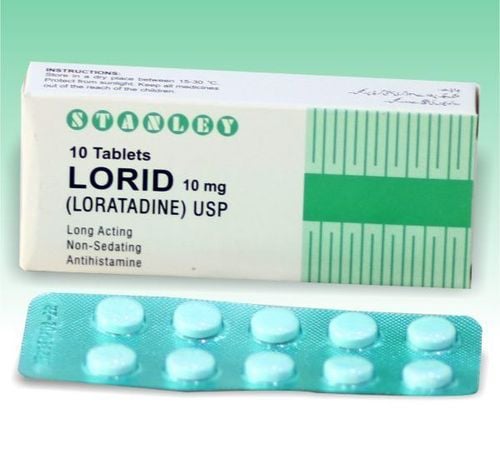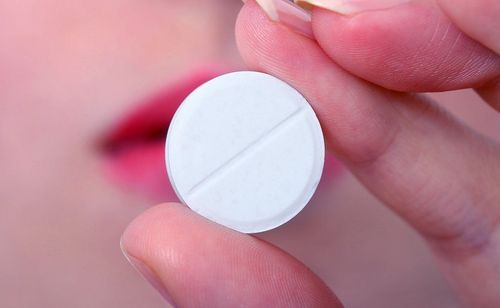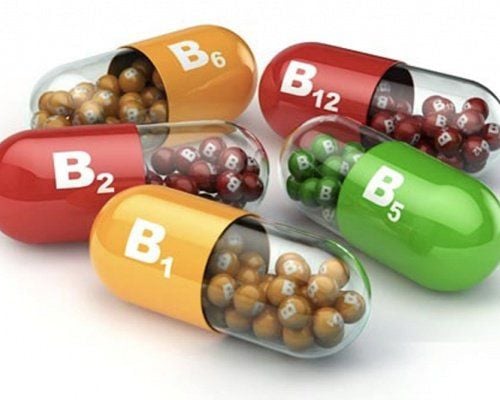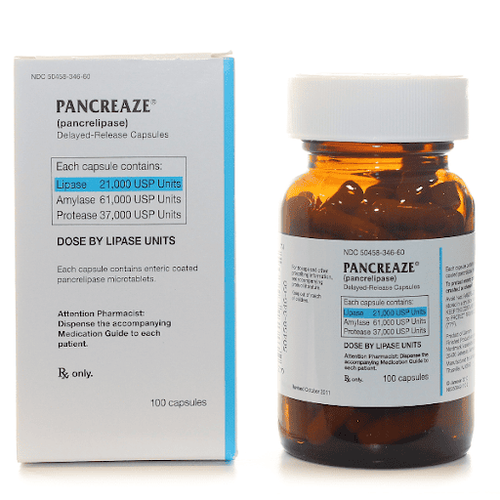This is an automatically translated article.
Nutrients are essential for the human body. If there is a lack of nutrition, people can become weak in health, increase the risk of many diseases,... The nutritional needs of the human body include substances: Protein, fat, carbohydrates, vitamins. , minerals, ... with reasonable content.
1. How is the body's nutritional needs expressed?
Although important for the body, most nutrients can be harmful if taken in excess. Therefore, it is necessary to determine the allowable limit of nutrients to put into the body. Nutritional requirements are expressed as the average daily energy and nutrients required by each person.
The body's nutritional needs include: Energy and protein, water-soluble vitamins (vitamin B6. vitamin B12, folic acid, thiamin, riboflavin, niacin, vitamin A), fat-soluble vitamins (vitamin A, D, K), minerals (calcium, phosphorus, magnesium, iron, zinc, iodine, selenium,...).
Body needs for energy would be recommended differently. In fact, there are specific nutritional needs for each target group. About 50% of the population will need more energy, the remaining 50% need less,...
In particular, nutritional needs can vary from individual to individual, day to day, to subject to subject. This need will vary depending on age, sex, weight, pregnancy and lactation,... In addition, nutritional needs also vary depending on the clinical situation: Premature birth, old age. chemistry, infection, chronic disease, metabolic disorders, drug use, climate, physical activity, daily eating habits,...

Cần quan tâm đến nhu cầu dinh dưỡng của cơ thể
2. The nutritional needs of the body include which components?
Need to ensure the following components when building a nutritional regimen for the body:
2.1 Energy The body needs energy to maintain physical activity and normal functions, support growth, repair damaged tissues. Energy is produced by the oxidation of proteins, fats, carbohydrates and alcohol from the diet. Specifically, oxidation of 1g of protein or 1g of carbohydrate produces 4kcal, 1g of fat produces 9kcal, 1g of alcohol produces 7kcal,...
In healthy adults, energy expenditure is mainly determined by 3 Factors: Basal energy expenditure (energy needed to maintain basic physiological activities), thermic effect of food (energy expended during and after eating) and physical activity (the impact of mainly on energy consumption).
To calculate energy needs, people use kcal units (1 kcal = 1,000 calories). Energy requirements in the average adult are: 2,600 - 3,000 kcal/day (men); 2,000 - 2,500 kcal/day (women).
In addition, daily energy needs are also changed depending on the intensity of labor:
Light labor: 2,200 - 2,400 kcal/day (mental labor); Medium labor: 2,600 - 2,800 kcal/day (workers, students); Heavy labor: 3,000 - 3,600 kcal/day (soldiers, athletes); Very heavy labor: > 3,600 kcal/day (forest workers, masons, porters). 2.2 Protein Protein is an indispensable component for the body's nutritional needs. Protein helps in growth and maintenance of body structure and function. Although nutritional requirements are expressed in grams of protein, the actual requirement is for the nine essential amino acids and nitrogen that are required for protein synthesis. The 9 essential amino acids include: Phenylalanin, threonine, tryptophan, leucin, isoleucin, lysine, methionine, valine and histidine.
Adequate amounts of protein need to be added to the body every day to replace essential amino acids lost through protein metabolism. With a protein-free diet, a middle-aged man will lose about 3.8g of nitrogen/day, equivalent to 24g of protein.
The body's protein needs are: 1 - 1.5g/kg/day. Nutritionists recommend that each person should limit the intake of animal protein and increase the intake of vegetable protein.
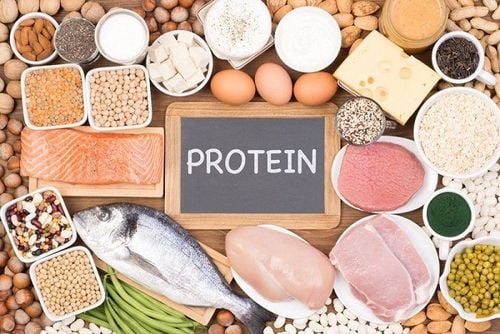
Protein chính là thành phần không thể thiếu đối với nhu cầu chất dinh dưỡng của cơ thể
2.3 Carbohydrates When learning about the nutritional needs of the body, it is impossible not to mention carbohydrates. When adequate amounts of protein and energy are provided in the diet, each person will not have a special need for carbohydrates.
Dietary carbohydrates include: Simple sugars, starches and fiber. Most of the carbohydrates in the diet should be derived from starches. Sugars (especially sucrose) are high in calories but lack the other nutrients needed by the body. Consuming sucrose increases the risk of tooth decay. Unrefined starches provide energy, carbohydrates, vitamins, minerals and fiber. A high-fiber diet is also important to aid digestion and reduce the risk of cardiovascular disease. Soluble fiber such as legumes, oats, fruits, etc. can lower blood sugar levels in diabetics and lower blood cholesterol.
The body's carbohydrate needs are: 5-7g/kg/day. Carbohydrates should make up about 65% of the body's total energy needs. Sources of this nutrient are found in cereals, potatoes, cane sugar,...
2.4 Fat For the nutritional needs of the human body, fat is an extremely important component, a source of nutrients. highest food energy. Like energy from carbohydrates, energy from fat can help with protein synthesis. In addition, dietary fat also provides linoleic acid, which is essential for the body. Diets containing 5-10% of calories from fat are safe and well tolerated by the body.
Dietary fats are mainly composed of fatty acids and cholesterol. Nutritionists recommend reducing total fat intake, replacing saturated fats with monounsaturated fatty acids and complex carbohydrates. This is because saturated fats raise blood cholesterol while monounsaturated fatty acids lower blood cholesterol. Saturated fats of animal origin, solid; unsaturated fatty acids of vegetable origin, liquid form.
Demand for body fat: 0.7 - 2g/kg/day. Fat should make up about 20% of the body's total daily energy needs. Fat is provided from 2 sources: animal fat and vegetable oil. Users should give priority to using vegetable oils such as sesame oil, soybean oil, peanut oil,... instead of pork fat, beef, chicken,...
2.5 Vitamin The nutritional needs of the human body need to have. vitamins. Vitamins are a heterogeneous group of organic molecules that are essential for the body to carry out essential metabolic activities. Most vitamins are not synthesized in the body or are synthesized in very small amounts, so they are essential in the diet. There are two known groups of vitamins: water-soluble vitamins and fat-soluble vitamins. The body's needs for vitamins are as follows:
Water-soluble vitamins: Vitamin C: Needs 50-75mg/day, found in broccoli, oranges, tangerines, strawberries, green pepper,... ; Vitamin B1: Need 1 - 1.4mg/day, abundant in rice germ, outer shell of cereals, animal liver, animal heart, green vegetables; Vitamin B2: Found in foods such as meat, fish, milk,...; Vitamin B6: Need 1.2 - 2mg/day, abundant in brewer's yeast, broccoli, banana; Vitamin B12: Rich in kidney, liver, milk,...; Fat-soluble vitamins: Vitamin A: Need 5,000UI/day, abundant in egg yolks, dark green vegetables and red and yellow fruits; Vitamin D: Need 400UI/day, abundant in milk, animal liver, can be absorbed through the skin under sunlight; Vitamin K: Need 1mg/day, abundant in amaranth, cabbage,...; Vitamin E: Needs 10 - 30mg/day, abundant in green vegetables, bean sprouts, wheat germ, herb oil,...
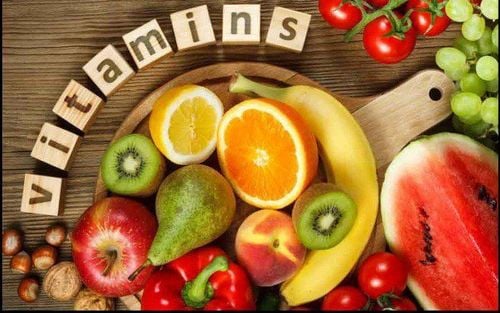
Nhu cầu dinh dưỡng của cơ thể con người cần có các loại vitamin
2.6 Minerals Minerals are inorganic compounds found in all body fluids and tissues. Minerals have many uses for health: They play an important role in the functioning and development of the body, participating in cell and tissue components. The body's need for calcium, magnesium and phosphorus is about over 100mg/day; The need for trace elements such as iron, manganese, zinc, iodine,... is less than 100 mg/day.
Some important minerals need to provide adequate for the body:
Sodium: Need 5g/day, abundant in sea fish, shrimp, crab, table salt,...; Potassium: Need 3g/day, abundant in meat, potatoes, mushrooms, carrots, amaranth; Calcium: Need 1 - 1.5g/day, abundant in milk, eggs, seafood; Iron: Need 2.5mg/day for women; 1mg/day for men. Iron is abundant in animal liver, some vegetables and fruits; Other minerals: Iodine, zinc, phosphorus,... supplemented with the right amount. 2.7 Water Water is the main constituent of body cells. Water makes up 65-70% of total body weight but is unevenly distributed. About two-thirds of the body's water is contained in cells (intracellular fluid). The remaining water is extracellular fluid, which includes body fluids such as plasma and interstitial fluid.
For the body's nutritional needs, water is more important than food because it provides the necessary amount of fluid for the body's physical and chemical reactions. Water acts as a solvent to dissolve organic and inorganic substances, supports digestion, absorption, circulation, excretion, nutrient transport, waste elimination,... Water secretion through the skin helps regulate body temperature. In addition, water protects tissues and organs (synovial fluid, cerebrospinal fluid,...).
In the diet, water sources include drinking water and liquid food. Water requirement is about 2.5 - 3 liters/day. This need can be adjusted, depending on the balance of water in/out, ambient temperature, body activity,...
Each person needs to meet the body's nutritional needs by taking supplements. Add to your diet the above ingredients in recommended amounts to ensure good health and limit the risk of disease.
Follow Vinmec International General Hospital website to get more health, nutrition and beauty information to protect the health of yourself and your loved ones in your family.
Please dial HOTLINE for more information or register for an appointment HERE. Download MyVinmec app to make appointments faster and to manage your bookings easily.





